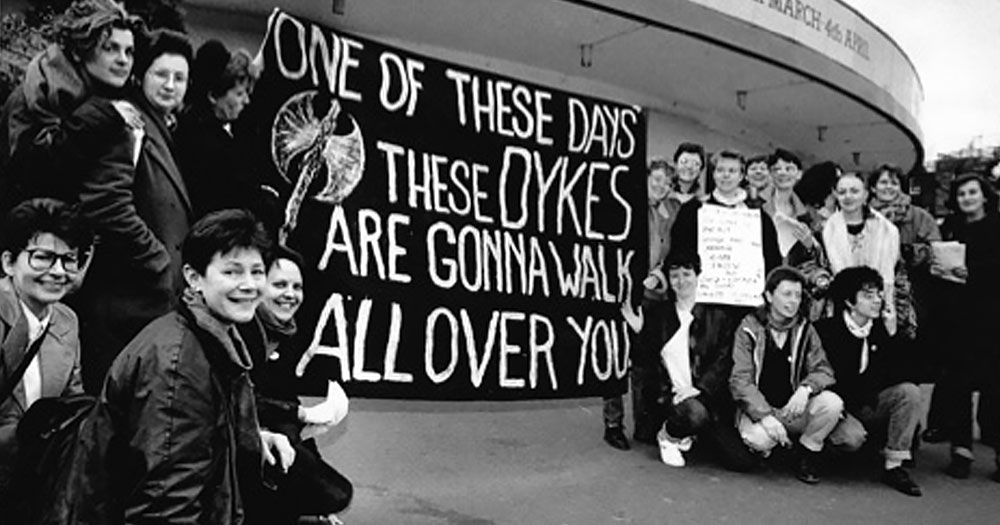The infamous Section 28 is one of the most controversial UK laws. It led to twenty thousand Mancunians taking the streets in protest, Ian Kellen came out to fight it, and marches took place all over the country. Among the fiercest protesters who fought against Section 28 were the brave lesbian women who stormed the Parliament and the BBC.
The year was 1988, and Margaret Thatcher was the Prime Minister of the UK. The British LGBTQ+ community was becoming more visible, increasing their unapologetic presence in public places and taking to the streets to demand equality. Not everyone was happy. Conservatives and traditionalists called on the government to do something about these people who argued that their “right to be gay was inalienable”.
The government’s response was Section 28 of the Local Government Act 1988, which effectively banned the “promotion of homosexuality” throughout the UK. The controversial law prohibited much-needed discussions on LGBTQ+ themes and identities in schools and by other local authorities. At a time when the AIDS crisis was at its peak, this law only suppressed even more an already marginalised group.
From the announcement of the law till its passage in May 1988, protests took place all over the country in one of the most successful civil rights movements in modern British history. During that period, Manchester hosted the largest LGBTQ+ protest in the country, with twenty thousand people taking to the streets.
Two events, in particular, went down in history for the bold protests staged by fierce lesbian activists against Section 28. In February, when a preliminary vote was taking place in the House of Lords, a group of lesbian campaigners planned an action to take the protest directly inside the parliament.
24th May 1988: Section 28, which made illegal the 'promotion' of homosexuality, is enacted in the United Kingdom. The law's existence caused many LGBT+ groups to close or limit their activities or self-censor. #OnThisDay #Queerstory pic.twitter.com/pV6FfmS7a4
— Gay Community News (@GCNmag) May 24, 2019
After the House voted in favour of Section 28, four lesbian activists climbed onto the balconies with laundry lines tied around their bodies to allow other women to hang from them. It was a theatrical gesture meant to draw attention to how harmful Section 28 was to LGBTQ+ people. Some of them were arrested and released after six hours, since they technically hadn’t committed any crime.
This particular protest was featured on the cover of the very first issue of the GCN magazine, out in 1988. The cover shows an illustration of the activists swinging from the balcony and cites: “As soon as the result was announced, three lesbians swooped down on ropes from the gallery, frightening the peers before being hustled out”.

Following that memorable episode, women found the most innovative and bold forms of protest against the law. However, none of those were reported by the media, so they decided to take matters into their own hands to become the news. On May 23, the same day when the law was voted on, a small group of lesbians led by Booan Temple raided the BBC studios during the Six O’Clock News.
The women interrupted the 6pm live broadcast which reported on the law just voted. They stormed the studio wearing t-shirts with the message “Stop the Clause”, handcuffed themselves to cameras and desks and were tackled to the ground and dragged away.
Despite these protests, Section 28 was only repealed in 2000 in Scotland and three years later in the rest of the UK. In 2009, Tory leader David Cameron, who had previously backed the law, apologised for the “mistake” that had been “offensive to gay people”.
Even though the UK government failed to take action for too long, the courage of all the legendary activists who fought against Section 28 will forever be a fundamental part of the history of our community.
© 2023 GCN (Gay Community News). All rights reserved.
Support GCN
GCN is a free, vital resource for Ireland’s LGBTQ+ community since 1988.
GCN is a trading name of National LGBT Federation CLG, a registered charity - Charity Number: 20034580.
GCN relies on the generous support of the community and allies to sustain the crucial work that we do. Producing GCN is costly, and, in an industry which has been hugely impacted by rising costs, we need your support to help sustain and grow this vital resource.
Supporting GCN for as little as €1.99 per month will help us continue our work as Ireland’s free, independent LGBTQ+ media.

comments. Please sign in to comment.